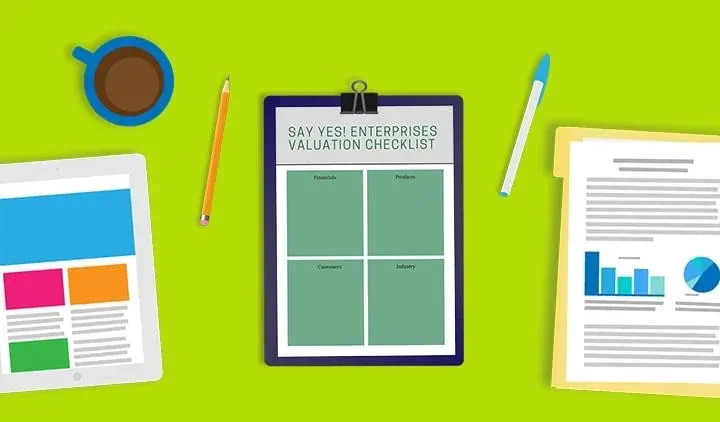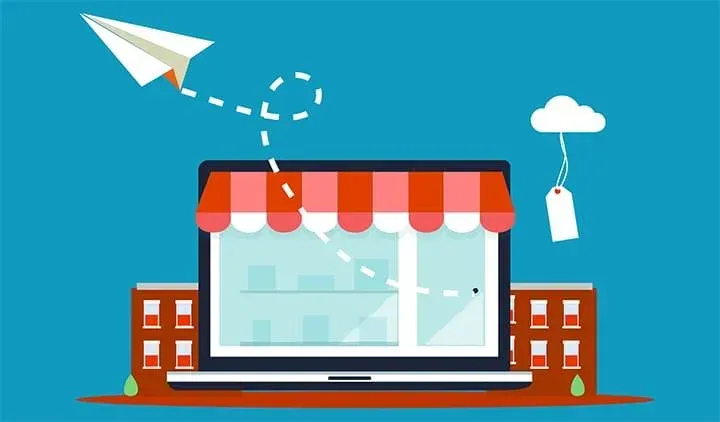An Ecommerce Acquisition Case Study by Say Yes! Enterprises
Written by Marissa B. on November 11th, 2020

In October of 2018, Say Yes! Enterprises (SYE) acquired an eCommerce store that began in 2016.
Through a series of quick and powerful changes, SYE made this great business an outstanding one. By March of 2018, the profitability rate of the business has already increased to 9.29%. Eleven months after the initial acquisition, SYE resold the business for a valuation that was 47.78% higher than the original purchase price. With all things combined, the original investment in the ecommerce business was tripled with retained earnings and proceeds from the business sale.
Background
Say Yes! Enterprises, a Texas-based business acquisition firm, purchased a successful eCommerce company. The company had been in business for several years. At the time of acquisition, each year of revenue was approximately less than $700,000 for any given year.
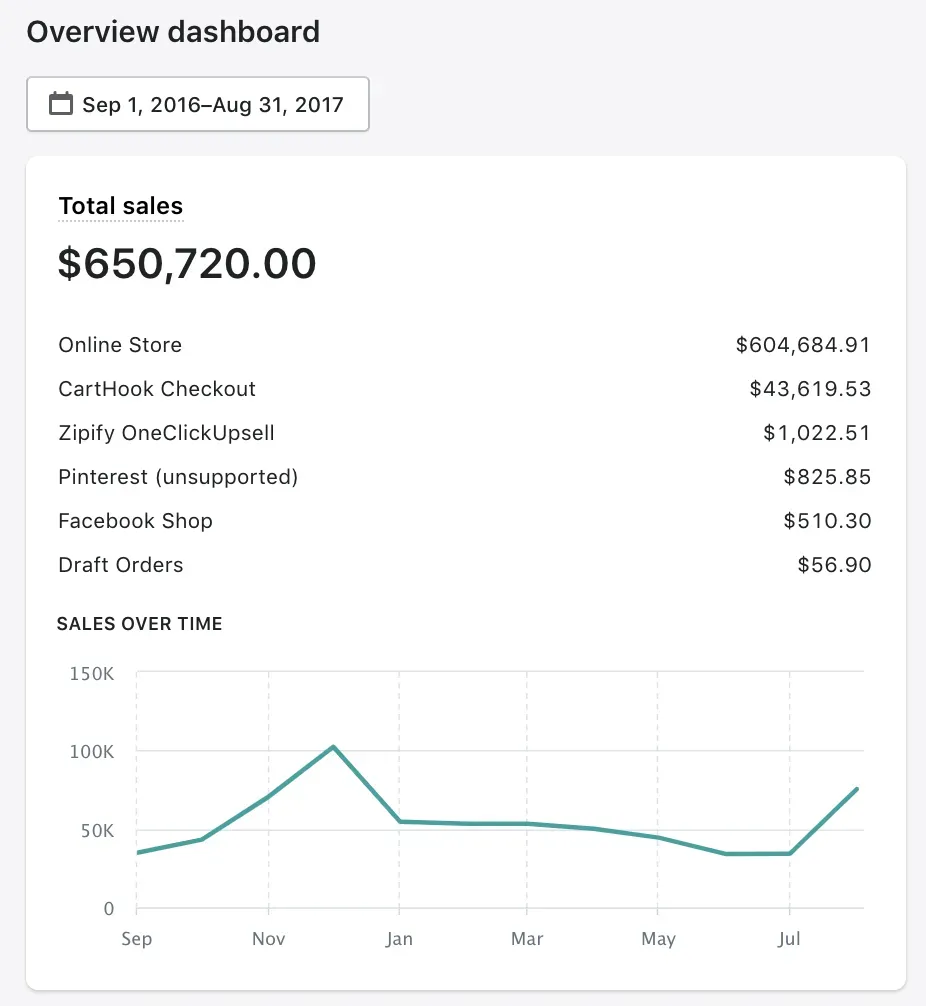
The eCommerce store catered to women with accessories, decorations, and other fashion items. With so many giftable products, revenue annually peaked during the holiday season. The skillful use of social media was key to reaching new customers. In fact, Facebook advertisements were originally the sole source of traffic, and they were producing great return on investment (ROI.) The business also developed a large list of customer emails. Cyclically, the early part of the year was always a period of profit loss, and the business was struggling to scale with a very small team.
Summary
Say Yes! Enterprises (SYE) purchased a popular eCommerce store. The store had several years of impressive revenues though inconsistent rates of profitability. Within 11 months, SYE resold the company. In that time, company valuation increased by 47.78%.
Acquisition
The eCommerce company had a strong valuation and was priced competitively compared to other stores in the market. After spending 9 months interviewing businesses for sale, Christopher Wick, founder of SYE, purchased this ecommerce store.
SYE had a lesser offer than competing investors for the same store, but the seller still chose SYE. What helped close the deal?
“He did not take my offer because it was the most money. He took my offer because he had begun to know me throughout our discovery process. We had spent some time understanding relationships, credibility, and my experience,” says Wick.
After closing the deal, Wick also paid the former owner for three months to train him and his team on what it took to keep his business running. To this day, Wick and the former owner keep in touch and keep each other up to date with the latest happenings in their respective industries. This is a perfect example of the respect and focus on creating win-win deals that permeates SYE culture.
The business had a large following on social media social media following and a 30,000+ customer email list. Wick understood that these two unconventional assets were lucrative. Wick also impressed the former owner with his focus on keeping current employees and seeing the owner's vision for his business to fruition.
Rather than having one social media channel, the business managed multiple Facebook and Instagram pages for each of the niches the store served. There were pages about puppies, prayers, and even unicorns. Each of those pages featured products that catered to the specific target audience.
From the first contact with the seller to the closing of the deal, the entire process took less than two weeks. SYE prides itself on being quick to close. Deals happen in a three phase process. In the first phase, there is a focus on getting to know the business owner. The second phase is all about learning the business financials. At the final phase, an offer is presented.
The Problems
eCommerce is an industry that thrives on marketing. There is no such thing as foot traffic when it comes to an online store. Every person who chooses to visit a website must either follow a direct link or type in the web address. That takes a certain level of customer awareness.
The prospect pipeline consisted of a robust Facebook ads campaign. At one time, the business was spending $1,600 per day on Facebook ads. Although ads helped to grow the business, ROI was not always consistent.
12 Months Ad Spend Prior to SYE Acquisition:
10/1/17-10/1/18

Total Ad Spend: $343,906.48
Total Website Conversion Value (Sales): $451,700.86
ROAS: 1.31
Monthly Average: $343,906.48/12 = $28,658.87
12 Months Ad Spend After SYE Acquisition:
10/1/18-10/1/19

Total Spent: $125,377.91
Total Website Conversion Value (Sales): $224,944.75
ROAS: 1.79
Monthly Average: $125,377.91/12 = $10,448.15
This is the lifetime spent on the previous Facebook account:

ROAS going from 1.31 to 1.79 is a 36.64% increase in ROI.
Lack of Traffic Diversification
Facebook ads rely on the effectiveness of Facebook. With the best of targeting, algorithms can render an audience that was lucrative yesterday ineffective today. There are holidays, days of the week, and times of day when consumers do not use Facebook as much.
The business had two other modes of interacting with customers. Prior to acquisition, the business had over 150,000 social media fans and over 30,000 customers on its email list. These were integral in making sure new and old customers were aware of promotions.
Lack of Employees
Originally, aside from the owner, the company only had two employees.. One employee handled customer support, and the other was responsible for order fulfillment. The owner handled social media, advertisements, and everything else.
With such a high order volume, each team member only had limited time to complete their tasks. There was no time for the higher level planning and analysis that it takes to keep a business growing.
Too Many Vendors
Fulfillment was arduous because the store used hundreds of vendors. Endless orders with hundreds of vendors happened daily.
This was a dizzying task that consumed all the time of one employee. It was also expensive. With an excessive number of vendors, accounting for the business became complicated. The outside accountant, who billed by the hour, spent inordinate amounts of time preparing the company’s books each month.
Long Deliveries
Customers also felt the brunt of the fulfillment issues. On average, orders took up to 21 days to arrive. If a customer ordered multiple items, they would receive each item one-by-one over the course of that lengthy 21-day delivery period. Shipping costs for both the business and the customer were abnormal. A single order could require three boxes shipped from three different countries.
Profitless Months
eCommerce is a cyclical business. The business always had banner months in November and December. January and February were also so slow that the business lost money. Since many of the store’s products made great gifts, sales skyrocketed during the holiday season. After that, sales plummeted.
The Growth
SYE follows the philosophy of five pillars of business. The pillars are marketing, finance, sales, operations, and delivery. Detailed analysis of each of these pillars revealed opportunities for improvement. SYE turned a good business that could not scale into a great business with even more profitability and value.
The business was not maximizing the value of every customer. As a marketer by trade, Wick has an in-depth understanding of how to turn followers into repeat customers.
One time customers keep revenue coming in, but it is not sustainable to keep getting a bunch of customers one time. It’s much easier to get people who have already purchased to continue making more purchases. A combination of strategies achieved higher average tickets and more repeat customers.
The focus of marketing turned to making sure people spent more the first time they came. With higher ticket averages, the business was sustainable with less customers. By maximizing the value of each customer, average order value increased from $27.67 to $36.59, a 32.24% increase.
10/1/18-10/1/19 (The 12 Months After Acquisition, Compared to: Sep 30, 2017–Sep 30, 2018)
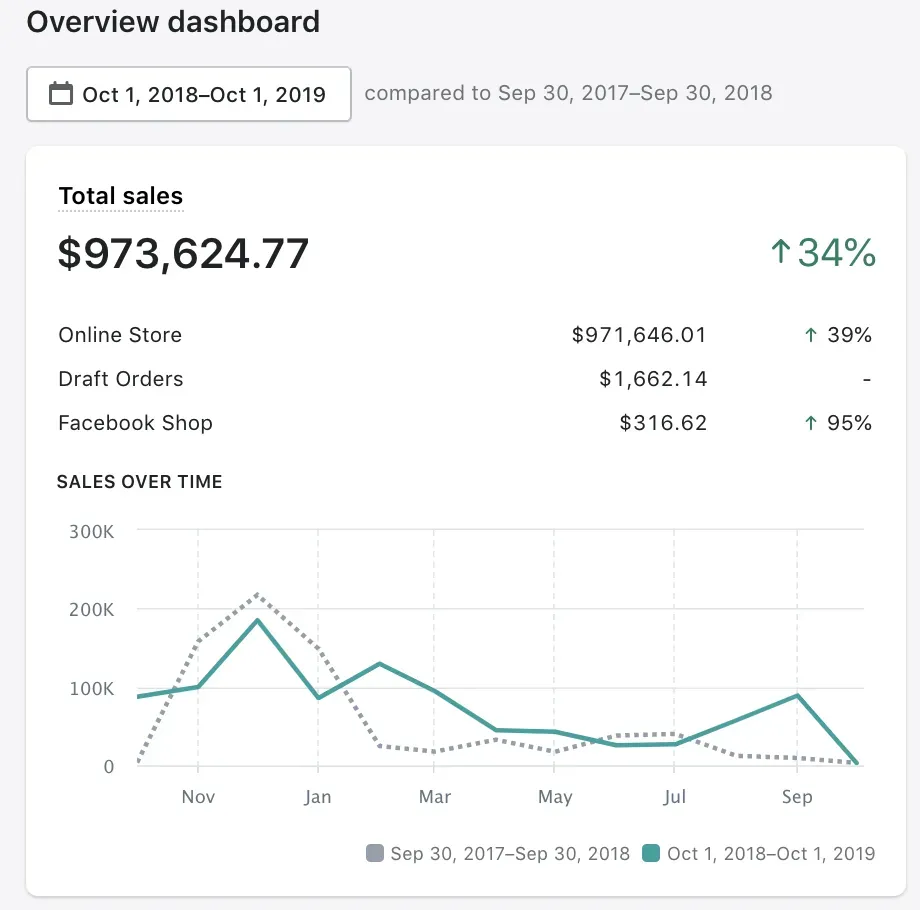
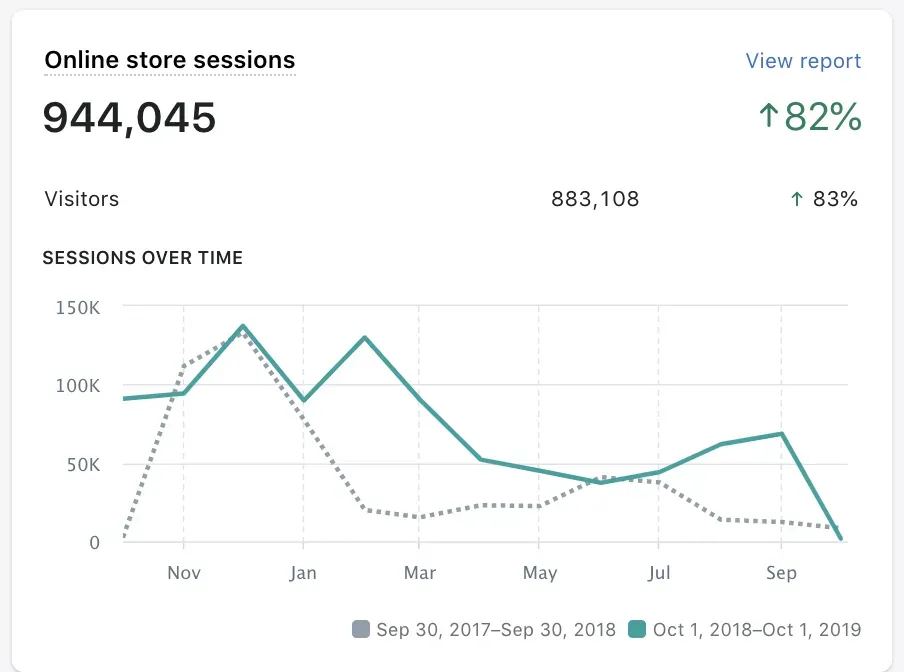
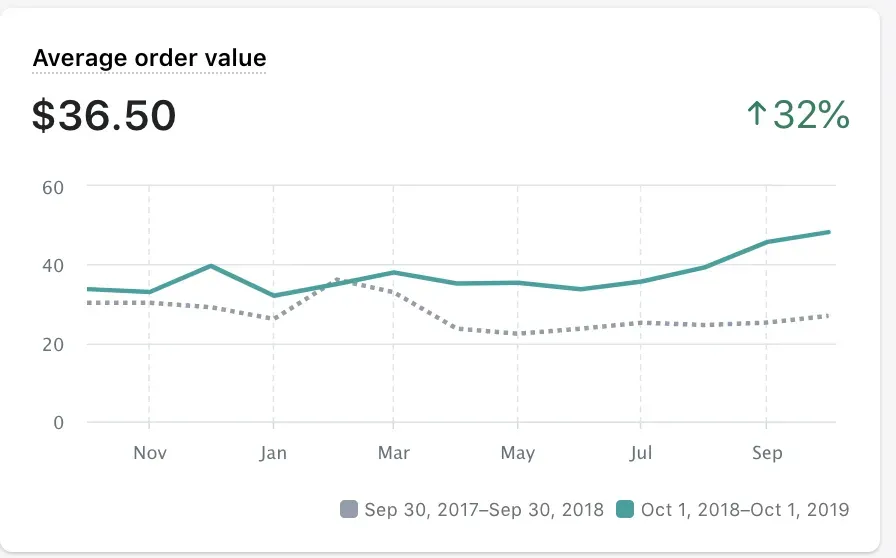
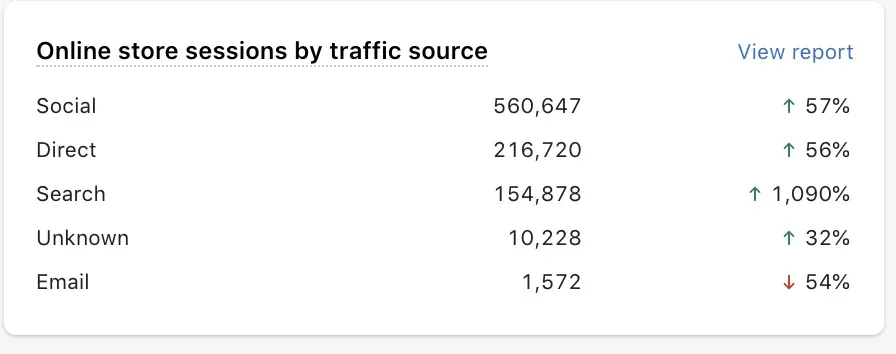
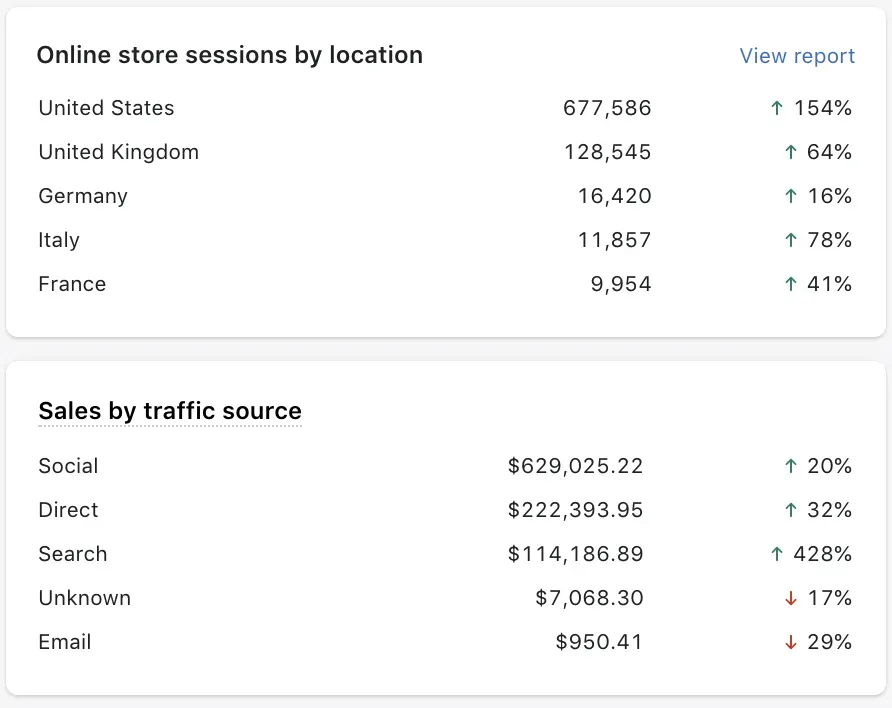
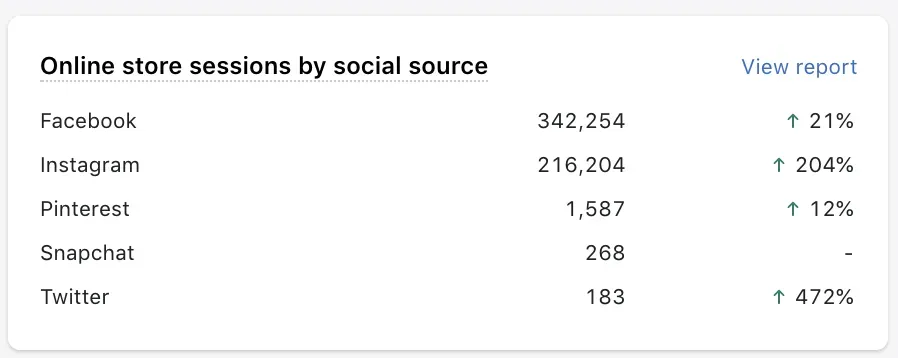
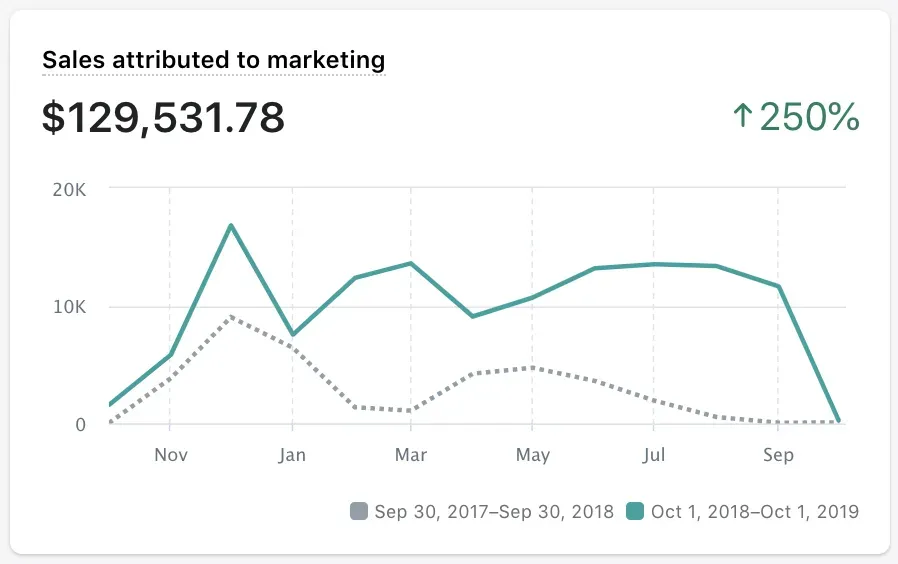
Nurturing the email list contributed to this growth. During the time that SYE owned the business, the email list rose from 30,000 subscribers to 126,738 subscribers. The email list received exclusive offers, so more customers wanted to join.
The store started carrying products that customers naturally bought more than once. Marketing also focused on the reasons that people buy. Most products catered to women, but some ads focused on the male audience that buys gifts for women.
New Year's and Valentine’s Day promotions of this sort made the business profitable in the winter months. During SYE’s ownership, this was a first because January through March had consistently been unprofitable months in previous years.
There’s a common phrase in business that consumers buy from the people and brands they know, like, and trust. The brand was well known, but the like and trust factors needed shoring up. The brand lacked personality and feeling.
When SYE acquired this eCommerce store, the brand was little more than a logo and colors. As is common for the industry, both Wick and the previous owner remained mostly anonymous. There was no brand story. There were no people for customers to grow to like and relate to.
Consumers could only equate this brand with products, and the products were not unique to the store.
The brand needed a face, and with a lot of strategy and a bit of creativity, a character named Tracy was developed. Tracy cost $10 for a designer on Fiverr to create, and she played a key role in taking the large business to new heights. Tracy’s name and face donned everything from chatbots to order updates and social media posts. Consumers began to trust the brand more when it had a more human touch to it.
This human touch grew when SYE purchased a customer support phone number for the brand. The phone number increased perceived legitimacy of the business and provided another way for customers to reach out.
There was further implementation of expanded customer support options. New hires handled more customer support via email and Zendesk. Customers could also receive support via text message.
Before the SYE acquisition, customer satisfaction was not measured. Responses from surveys helped to improve the business based on customer feedback.
Purposeful marketing strategy is key to success in eCommerce. Facebook was originally the only source of traffic for the business. This was a key reason for a lack of consistent profitability.
Traffic diversification helped to increase the valuation of this business. When it comes to marketing online, there are going to be “bad days.” If you are marketing in a variety of places, those bad days don’t have as significant an impact on your bottom line.
SYE implemented a marketing strategy that utilized Twitter, YouTube ads, organic social media on Facebook, email marketing, text message marketing, Pinterest, Google ads, and Google SEO.
By advertising on a variety of networks, the business was able to tap into new customer markets. A “bad day” on Facebook no longer spelled a loss. If one ad network performed poorly, the traffic from the other networks could compensate.
The use of Google ads also led to an increase in valuation. A business that comes with a perfected marketing plan is much more valuable. That’s why under SYE’s ownership, $5,000 was spent per month testing and perfecting a list of Google keywords to bring in more business.
Google keywords are a very valuable method of marketing when the keywords work. After testing a wide variety of marketing, there was data to back the six methods that worked the best.
The new owners of the ecommerce store valued this keyword list and added to the benefit of owning this particular store.
The number of employees needed to grow for the business to scale. SYE tripled the staff within 90 days of acquisition. One of the employees was a skilled writer, who wrote high converting product listings and sales copy. The other new employees added to the order fulfillment and customer service teams. Finally, employees could work for efficiency and profitability rather than mere necessity. This growth primed the company to handle the explosion of new business due to better marketing.
With better management, marketing and profitability, there was also an opportunity to increase valuation. Profitability was a strong detractor for the valuation of the company. In 2017, the year before SYE purchased the company, the business made $658,000 in revenue, but profitability was only 6.4%, which is well below average. To get profitability more consistent with market rates, SYE focused on increasing profit during off season months.
The Valentine's Day and New Year's promotions helped to eliminate months of profit loss. Since there were more than two employees, processes and costs were more consistent. Time consuming problems no longer caused productivity to halt. Operating costs, labor costs, and advertising costs stabilized and became more predictable. There was a much clearer picture of the number of sales necessary to make a profit. These changes increased the profitability rate of the business to 9.29% in the store’s new 7 figure revenue, thereby nearly doubling annual profit.
To decrease fulfillment costs, SYE switched to a single mega supplier, rather than hundreds of smaller ones. Accounting became quicker and internally cheaper. Bulk orders saved the company money, and shipping costs also went down. Customers received single deliveries for multiple items in as little as 7 days, rather than the original 21 days.
In 11 months, SYE sold the company for 47.78% more than the original purchase price. In that time, average tickets grew by 32.24%, revenue increased by 32.43% and profits rose by 18.18%.
SYE has the expertise to identify roadblocks to making a business scalable, sellable, and profitable. The company has a keen understanding of the elements that make a good business as well as the experience necessary to transform a good business into an great one.
If you are considering selling a business or investing in an existing business, contact SYE enterprises today.

About Say Yes! Enterprises
Say Yes! Enterprises is an investment management company that acquires, builds, and sells companies that benefit shareholders, customers, team members and communities at large.

About Christopher Wick

Investor, 9X Award-Winning Entrepreneur, and 5X Best-Selling Author & Speaker
Founder/Principal of businesses that have been featured by Huffington Post, ABC, NBC and Wall Street Select
Christopher Wick is an award-winning entrepreneur who has built, bought and sold various companies relating to social media marketing, e-commerce, real estate, retail and investing.
Other Articles:
Work With Us Today!
ABOUT
Say Yes! Enterprises is an investment management company that acquires, builds, and sells companies that benefit shareholders, customers, team members and communities at large.


